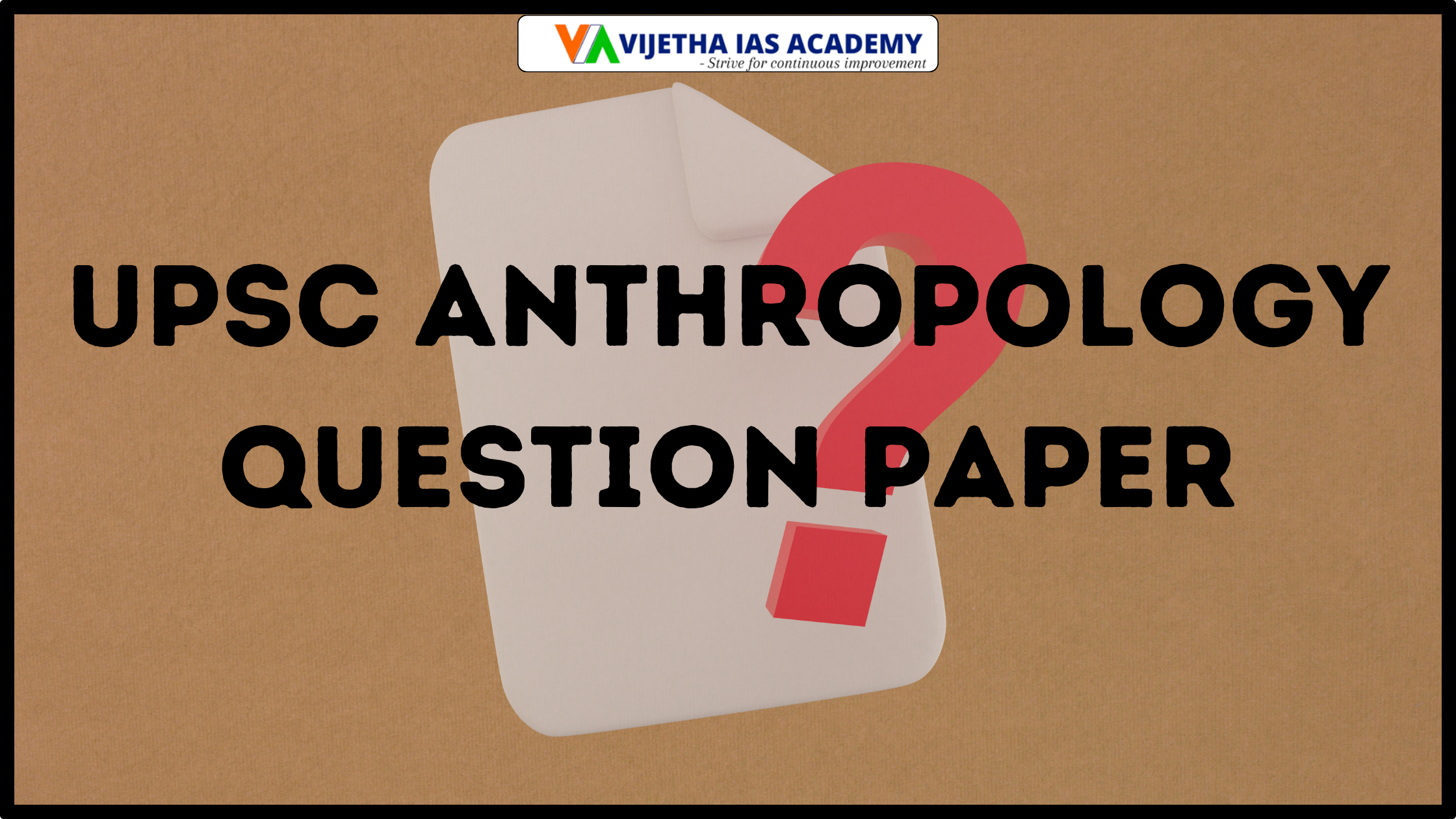
UPSC Anthropology Question Paper
The UPSC Civil Services Examination is one of the most prestigious and challenging exams in India. Among the various optional subjects, Anthropology has gained popularity due to its well-defined syllabus and high scoring potential. Analyzing and practicing past question papers is a crucial step in preparing for the UPSC Anthropology exam. In this blog post, we will explore the structure of the UPSC Anthropology question paper, provide tips on how to effectively use previous question papers for preparation, and highlight how Vijetha IAS Academy and Kishore Sir can guide you towards success.
Why Choose Anthropology as an Optional Subject?
Anthropology is a multifaceted discipline that explores human societies, cultures, and biological aspects. It is a favorite among UPSC aspirants for several reasons:
- Concise Syllabus: The syllabus is well-defined and can be covered comprehensively within the available time.
- High Scoring Potential: With systematic preparation, Anthropology can yield high scores.
- Interdisciplinary Approach: The subject overlaps with topics in General Studies papers, providing a well-rounded understanding.
- Interesting Content: The subject matter is intriguing and relevant, which keeps aspirants motivated.
Structure of the UPSC Anthropology Question Paper
The UPSC Anthropology optional paper is divided into two papers: Paper I and Paper II. Each paper is of 250 marks, making a total of 500 marks. The questions are designed to test the aspirant's understanding of concepts, theories, and their application.
Paper I: General Anthropology
Section A: Physical Anthropology
- Human Evolution and Variation: Questions on theories of evolution, fossil evidence, and genetic principles.
- Primatology: Study of primates, their behavior, and evolutionary significance.
- Biological Basis of Life: Cell biology, DNA, and molecular biology concepts.
- Human Genetics: Mendelian genetics, mutation, genetic disorders, and population genetics.
Section B: Social-Cultural Anthropology
- Introduction to Anthropology: Definition, scope, and development of Anthropology.
- Society and Culture: Concepts of society, culture, kinship, marriage, and family.
- Economic and Political Organization: Study of economic systems, political structures, and social control.
- Religion and Magic: Belief systems, rituals, and religious practices.
Paper II: Indian Anthropology
Section A: Indian Prehistory and Evolution
- Prehistoric Cultures: Paleolithic, Mesolithic, Neolithic cultures, and their significance.
- Protohistoric Cultures: Indus Valley Civilization and other early societies.
Section B: Social and Cultural Dimensions
- Caste System: Historical evolution, current trends, and social dynamics.
- Tribal Societies: Distribution, characteristics, and issues facing tribal communities.
- Linguistic and Religious Diversity: Major languages, linguistic regions, and religious practices in India.
- Applied Anthropology: Role in planning, development, and solving contemporary social issues.
Importance of Analyzing UPSC Anthropology Question Papers
Analyzing previous years' question papers is essential for effective UPSC preparation. Here are some reasons why:
- Understanding the Exam Pattern: Familiarizing yourself with the structure and format of the question paper helps in strategizing your preparation.
- Identifying Important Topics: Regular analysis of question papers highlights the frequently asked topics and areas of focus.
- Improving Answer Writing Skills: Practicing past papers enhances your ability to write concise and coherent answers within the given time frame.
- Time Management: Solving previous question papers helps in managing time effectively during the actual exam.
- Boosting Confidence: Regular practice instills confidence and reduces exam anxiety.
How to Effectively Use UPSC Anthropology Question Papers
1. Start Early
Begin solving previous years' question papers early in your preparation. This helps in identifying your strengths and weaknesses and allows ample time for improvement.
2. Analyze Trends
Look for patterns and trends in the questions. Identify topics that are frequently asked and prioritize them in your study plan.
3. Practice Regularly
Set aside dedicated time for solving question papers. Regular practice helps in retaining information and improving answer writing speed.
4. Review and Revise
After solving each paper, review your answers critically. Identify areas of improvement and revise those topics thoroughly.
5. Simulate Exam Conditions
While practicing, simulate exam conditions by setting a timer and adhering to the word limit. This helps in managing time effectively during the actual exam.
How Vijetha IAS Academy Helps You with UPSC Anthropology Question Papers
At Vijetha IAS Academy, we understand the importance of thorough preparation and regular practice. Our expert faculty, led by Kishore Sir, provides comprehensive guidance and resources to help you excel in the UPSC Anthropology optional paper. Here's how we assist you:
Expert Guidance by Kishore Sir
Kishore Sir, with his vast experience and in-depth knowledge of Anthropology, provides personalized guidance to each student. His teaching methodology includes:
- Detailed Explanation of Concepts: Simplifying complex topics for better understanding.
- Regular Practice Sessions: Conducting practice sessions using previous years' question papers.
- Answer Writing Techniques: Teaching effective answer writing skills and strategies.
- Regular Feedback: Providing constructive feedback on practice papers to help you improve.
Comprehensive Study Material
Our study material includes:
- Previous Years' Question Papers: A compilation of past question papers for regular practice.
- Model Answers: Sample answers to help you understand the ideal way to approach and write answers.
- Topic-wise Analysis: Detailed analysis of important topics and frequently asked questions.
Success Stories
Several toppers from Vijetha IAS Academy have credited their success to the academy's meticulous preparation strategy and comprehensive study material. Our holistic approach ensures that you are well-prepared to tackle any question that comes your way in the Anthropology optional paper.
Conclusion
Mastering the UPSC Anthropology question paper requires a strategic approach, regular practice, and thorough understanding of the syllabus. Analyzing and solving previous years' question papers is a crucial step towards achieving this goal. Vijetha IAS Academy, under the expert guidance of Kishore Sir, provides the necessary resources and guidance to help you excel in your preparation.
Embark on your UPSC journey with confidence, equipped with the right study materials and expert guidance. Start solving UPSC Anthropology question papers today and take a step closer to achieving your dream
